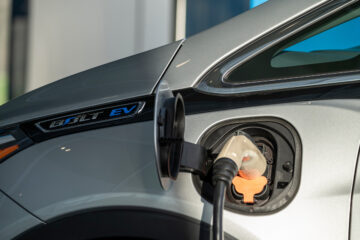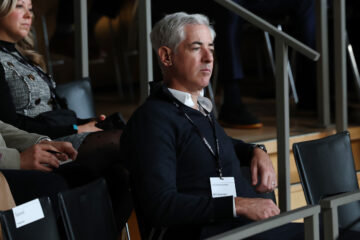One if by land, two if by sea, and if you get there first, buy an iPhone for me.
With all this tariff talk dominating the news cycle, consumers are reportedly hotfooting it to their nearest Apple (AAPL) stores to snag iPhones before the price tags blast off for Never-Never Land.
💵💰Don’t miss the move: Subscribe to TheStreet’s free daily newsletter 💰
Apple’s U.S. retail stores reportedly saw higher sales over this past weekend than in prior years in at least some major markets, Bloomberg reported, as shoppers expressed concern that prices will soar after the Trump administration’s tariffs begin to show up in shelf prices.
China has announced an 84% tariff on U.S. imports, to take effect on April 10 after President Donald Trump imposed a 104% tariff on Chinese goods entering the U.S.
Most iPhones, Apple’s best-selling and most important product, are manufactured in China.
Apple CEO Tim Cook’s company is under extreme pressure.
Justin Sullivan/Getty Images
Analyst warns of Trump tariff Armageddon
Meanwhile, while customers were racing to the stores, Apple was taking to the air, as the computer giant flew five planes full of iPhones and other products out of India to the U.S. in just three days during the final week of March, the Times of India reported.
Apple reportedly plans to import more iPhones from India to the U.S. to avoid the high tariffs Trump imposed on China. Trump had announced 27% tariffs on all goods imported from India.
The tariff trouble centers on Trump’s desire to bring manufacturing jobs to the U.S. and administration officials have pointed to Apple’s plan to invest $500 billion to expand U.S. facilities.
More Tech Stocks:
Top analyst revisits Tesla stock price target as Q1 earnings loomGoogle’s Waymo is planning a move that’s downright creepyAnalyst reboots Apple stock price target after tariff meltdown
The White House press secretary, Karoline Leavitt, said on April 8 to that “if Apple didn’t think the United States could do it, they probably wouldn’t have put up that big chunk of change.”
Analysts have doubts about this scenario, including Wedbush’s Dan Ives, who bemoaned “the Trump Tariff Armageddon.”
“A U.S. tech company CEO cannot decide last night … ‘Let’s call Smith Semi Fab Operations in the Midwest to get those semi chips’ … as there is one slight problem: … IT DOES NOT EXIST … and would take four to five years to build a manufacturing plant,” the analyst wrote in a research note.
Related: Veteran fund manager revises Marvell position after big M&A deal
“And the labor force does not support this in the U.S. … [The] IP of the supply chain is cemented in Asia after 30 years of making U.S. tech products.”
Ives said that given the current situation, he didn’t expect any tech companies, including Apple, to give any guidance on the first-quarter conference calls over the next month, given the sharp economic uncertainty.
“Apple and Nvidia remain two core tech names to own, and despite this massive near-term uncertainty it does not change their installed base, technology leadership, and long-term growth opportunities, especially with Nvidia leading the AI industry,” said the analyst, who has outperform ratings on both tech giants
Apple, scheduled to report earnings May 1, has been hit hard by the tariff tumult, with its stock valuation falling by more than $500 billion in the final two trading days of last week.
B of A sees iPhone price hike
Bank of America Securities contended that it may be possible to move the iPhone’s final assembly to the U.S.
But the investment firm said that a significant portion of the subassemblies likely would still be manufactured elsewhere, assembled in China, and imported to the U.S. That’s because moving the entire iPhone supply chain would be “a much bigger undertaking and would likely take many years, if even possible,” B of A said.
The investment firm estimated iPhone cost could increase 25% purely on higher labor costs in the U.S. It added that if Apple had to pay reciprocal tariffs to import subassemblies into the U.S., it would see the total cost of an iPhone “increasing 90%+.”
The firm maintained a buy rating and $250 price target on Apple shares.
Jefferies upgraded Apple to hold from underperform with a price target of $167.88, down from $202.33, according to The Fly.
The firm reduced iPhone shipment estimates by up to 7% through fiscal 2027 due to global recession risks. And it cut its artificial intelligence revenue forecasts in fiscal 2028 and beyond given a bearish view on smartphone AI.
Jefferies still assumes Apple will be exempted from U.S. tariffs and it upgraded the shares to hold given the recent selloff. However, Apple shares are “still not cheap,” the firm said.
Related: Analyst reboots Apple stock price target after tariff meltdown
The investment firm’s base case remains that Apple would be exempted from U.S. tariffs, given the $500 billion planned U.S. investment and given its belief that Cupertino would make additional manufacturing investment commitments in the U.S.
But a rising risk of global recession “could further impact already-weak iPhone demand,” the firm said.
Morgan Stanley slashed its price target on Apple to $220 from $252 and kept an overweight rating on the shares.
Near-term headwinds remain significant, and the confrontation with China risks unlocking the bear case, the investment firm wrote.
But Apple has “several mitigation efforts at play” while the market is already increasingly pricing in a number of concerns, it said.
Related: Veteran fund manager who forecast S&P 500 crash unveils surprising update


